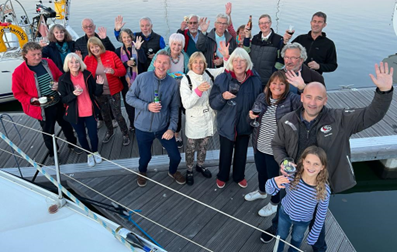- This topic is empty.
-
AuthorPosts
-
January 19, 2010 at 9:21 pm #6362
Anonymous
My boat came with the echo sounder calibrated to display depth below the keel. I understand the logic of that, but I prefer the sounder to display water depth; it doesn’t take a great deal of mental gymnastics to know that I need 1.90 on the display to avoid going aground! Can anyone tell me what the offset should be to achieve this? ie how far below the surface is the sounder transducer? Boat is a Bav 30 Cruiser.
January 20, 2010 at 6:10 am #8133Anonymous
Hi Paul,
I have a Bavaria 31 and have the same preference as you…it makes sense to me to know the depth from the surface. Plus it makes it easier to find a particular depth desired to anchor at, or calculate the right length for a particular scope, without any mental math. Our hulls are essentially the same, and my memory is that when I looked into this the offset was 2 or at the most 3 feet (can’t remember if it’s called negative or positive, I think the latter because it’s added to the measured depth, but the RayMarine manual for the sounder explains it) . I think I went with 2 as the more conservative number…
Riyad
SV “Battuta”
Vancouver, CanadaJanuary 20, 2010 at 3:24 pm #8134Anonymous
Even 2 feet sounds quite a lot. i’ve just been looking at the photos from when she was lifted: waterline to bottom of hull looks like a quarter to a third of total draught. At 1.85m, one-third would be 2 feet (sorry about the mixed units). One-quarter would be 0.45m which is about 1 foot 6 inches.
I’ve just realised that I should be able to calculate a figure from the existing setting. It will currently have the offset from tranducer to keel. 1.85 minus that figure is the offset of transducer to waterline (in the opposite direction).
I can also double-check using the depth of water in the marina.
Current reading minus 1.85 is the depth of water.
Put in the new setting and check again.January 20, 2010 at 7:25 pm #8135Anonymous
Hi Paul,
On our 30 (Hunros, version 1.0) I just entered a zero offset and then tried double checking the reading with a leadline, I am sure I left it set with a zero offset as it was hard to tell how much of the difference was the leadline sinking in the mud on our berth and how much was the sounder being below water level.
if it helps I have attached a photo of Hunros (1.85m draft) sat on the Sealift at Cowes, the sounder isn’t very far below the waterline.
And if the photo doesn’t help you it was at least nice for me to look back at some old Hunros (v1.0) photos!
Cheers
Paul.January 22, 2010 at 1:00 am #8137Anonymous
Interesting issue.
Paul, your solution is numerically correct but presumes that the dealers estimate of the distance from the transducer to the keel is more accurate than your estimate from the waterline to the transducer….
I suspect you’re right that 2 feet is probably a smidge on the high side, but I think it’s probably the most accurate whole number. I can’t recall, can one enter a fraction of a foot for this (eg 1.5)? If you look at the photo Paul #2 sent you can see that the transducer is just shy of 1/3 the distance from the waterline to the keel bottom, which again is around 2 feet.
Let me know what you figure out and what number you end up inputting.
-Riyad
January 22, 2010 at 9:04 pm #8140Anonymous
According to the handbook, the calibration is done in 0.0. I don’t know whether that implies that it works in increments of tenths of a foot if you use the furlongs, firkins and fortnights scale, but for sure it means tenths of a metre. Apart from comparing with the current calibration, I’m minded to set it to 0.4 or 0.5m.
January 23, 2010 at 9:59 am #8141Anonymous
You can get a reasonable estimate of the distance from transducer to waterline while the boat is still in the water.
Find an area inside near the transducer where you can see the bare hull. Then get someone outside to shine a strong torch or searchlight at the top of the antifouling; inside you should be able to see this clearly through the fibreglass. It should then be straightforward to measure (estimate) the height from the transducer to the top of the antifoul, accurately enough for all practical purposes!
Roger
-
AuthorPosts
- You must be logged in to reply to this topic.




